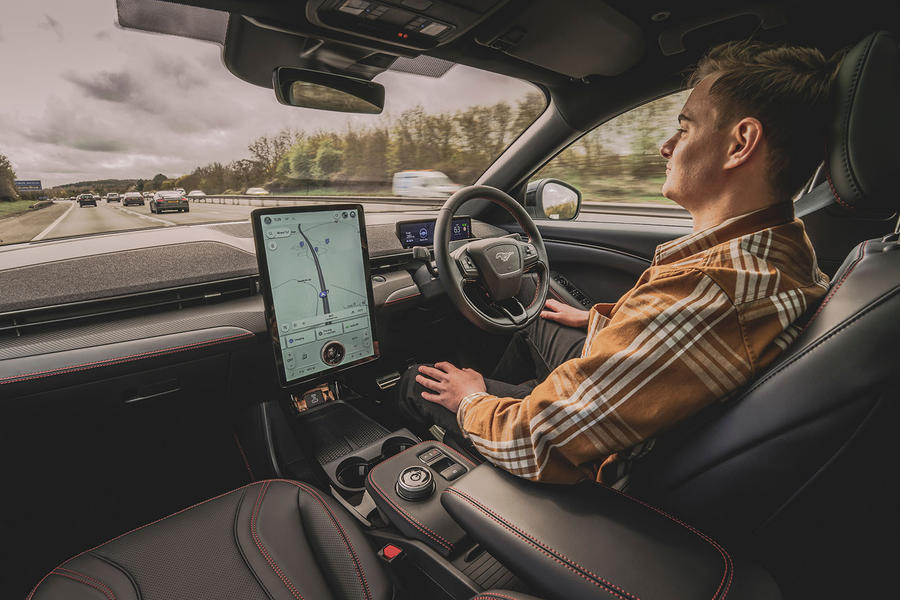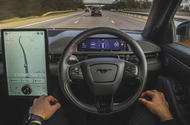Automated Vehicles Bill will focus on safe deployment and commercialisation of self-driving technologies
New laws around deploying autonomous vehicles on UK roads will be introduced, King Charles III has promised in his maiden speech to parliament.
The legislation – tipped to be called the Automated Vehicles Bill – will focus on the safe deployment and commercialisation of self-driving technologies, giving the push towards the mass roll-out of self-driving vehicles a huge boost.
During his first address, which marked the start of the new parliamentary year, the King said: “My ministers will introduce new legal frameworks to support the safe commercial development of emerging industries, such as self-driving vehicles.”
It follows calls from a group of MPs urging government to pass comprehensive legislation for autonomous vehicles in order to prevent the UK falling behind other nations.

Currently, fully automated driving systems are not legal in the UK; they are pencilled for 2025 – a date that has slipped from 2021.
Safety the key to self-driving vehicles bill
Many of the UK’s leading automotive bodies have welcomed the news but called for safety to be at the forefront of the new legislation.
AA president Edmund King said: “The plans to introduce self-driving vehicles provide the opportunity for more efficient travel, but safety must be paramount when [they’re] rolled out onto UK roads.
“Vehicle technology to improve road safety can be designed into cars more quickly, reducing the likelihood of crashes, the workload of the emergency services and avoidable casualties.”
RAC head of policy Simon Williams said: “While the concept of truly driverless vehicles being commonplace on our roads might still be a little sci-fi to the average driver, there is no doubting the need for this bill. The technology is moving at pace and it’s vital the UK isn’t left behind.”
Sarah Gates, director of Wayve, a London-based AI start-up developing self-driving technology, called the pledge “an incredibly important milestone for the entire self-driving industry”.
“The new Automated Vehicles Bill will enact a comprehensive liability framework for the safe deployment of self-driving vehicles, including crucial protection for consumers,” she added.
Tara Fole, the UK and Ireland CEO of insurer Axa, said the bill “has huge potential to save lives” and that “for insurers, it also provides crucial clarity for establishing liability for self driving”.

Get UK’s road ready ahead of self-driving vehicles
The bill pledge has also been used as a call to fix the UK’s roads ahead of the arrival of this next generation of vehicles.
“If we’re ever to truly realise the benefits of autonomous technology, we have to sort out the state of our roads once and for all,” said Williams.
“It’s hard to fathom how driverless cars will be able to safely navigate our streets when so many road markings are faded, and then there’s the prospect of vehicles getting needlessly damaged by the UK’s pothole plague, as they surely won’t be programmed to avoid them.”
His point was backed by King: “Government plans to improve everyday journeys requires a greater focus on dealing with the number-one issue raised by 96% of AA members: potholes and road condition.”
What needs to be in the UK’s self-driving bill?
![]()
The UK’s cross-party Transport Committee said ministers needed to legislate before the next general election because the current laws for self-driving vehicles (SDVs) are “archaic and limiting”.
Transport Committee chairman Iain Stewart said: “Self-driving vehicles [SDVs] are a Great British success story in the making, and we have a competitive advantage over many other countries.
“But all that hard work could be at risk if the government doesn’t follow through and bring forward a transport bill in the next parliamentary session, before the next general election.
“Widespread take-up of SDVs face various hurdles, including public confidence in their safety, security and their potential to have knock-on impacts on other road users. If the government is going to meet its ambitions for self-driving vehicle deployment, these knotty issues need to be addressed.
“We believe the government should take a cautious, gradual approach, with SDV technologies only initially introduced in well-defined contexts, or else we risk unintended consequences.”
MPs have questioned the government’s proposed “safety ambition” that autonomous vehicles will be “expected to achieve an equivalent level of safety to that of a competent and careful human driver”, believing it’s “too weak and too vague”.
The committee also said the government should set out a strategy for the future of human driving in a world of SDVs, including possible changes to driving tests and a plan to ensure all drivers fully understand SDVs.
Legal liability in SDVs will become more complex, because it’s shared between owner and vehicle software operators. The committee has recommended the government thinks more about this.
Support for bill recommendations
Tom Leggett, vehicle technology specialist at Thatcham Research, said: “We support it. There are some good recommendations, the primary one being the data access.
“We need access to the data of these autonomous vehicles to make them safe. We need to change how we share vehicle data between the government, manufacturers and the insurers. This is the key for making self-driving vehicles much smoother.
“The reason why we need this data is because we need to figure out if the car is driving or the human is; and the insurance companies need much more access to telematic than they currently have.”
Additional reporting by Murray Scullion
Source: Autocar
